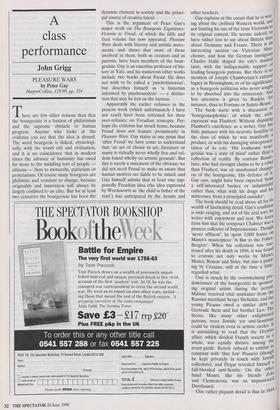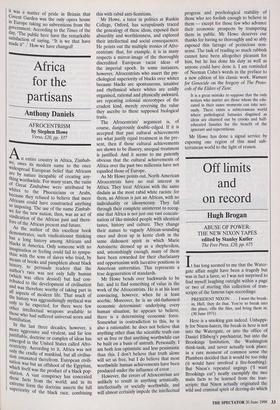A class performance
John Grigg
PLEASURE WARS by Peter Gay
HarperCollins, £29.99, pp. 324
There are few sillier notions than that the bourgeoisie is a bastion of philistinism and the supreme obstacle to human progress. Anyone who looks at the evidence can see that the idea is absurd. The word bourgeois is linked, etymologi- cally, with the words city and civilisation, and it is no coincidence that in modern times the advance of humanity has owed far more to the middling sort of people citizens — than to monarchs, patricians or proletarians. Of course many bourgeois are philistine and resistant to change, because originality and innovation will always be largely confined to an elite. But for at least two centuries the bourgeoisie has been the dynamic element in society and the princi- pal source of creative talent.
This is the argument of Peter Gay's major work on The Bourgeois Experience! Victoria to Freud, of which the fifth and final volume has now appeared. Pleasure Wars deals with literary and artistic move- ments, and shows that most of those involved in them, both as creators and as patrons, have been members of the bour- geoisie. Gay is an emeritus professor of his- tory at Yale, and his numerous other works include two books about Freud. He does not wish to be called a `psychohistorian', but describes himself as 'a historian informed by psychoanalysis' — a distinc- tion that may be lost on the layman.
Apparently the earlier volumes in the present work (which unfortunately I have not read) have been criticised for their over-reliance on Freudian concepts. Per- haps the criticism has struck home, because Freud does not feature prominently in Pleasure Wars. Gay states at one point that `after Freud' we have come to understand that 'an act of choice in art, literature or music is virtually never wholly free and sel- dom based wholly on artistic grounds'. But this is surely a statement of the obvious; we did not need Freud to make us aware that human motives are liable to be mixed, and Gay himself admits that at least one sup- posedly Freudian idea (the idea expressed by Wordsworth as 'the child is father of the man') was anticipated by the Jesuits and other teachers. Gay explains at the outset that he is writ- ing about the civilised Western world, and not limiting his use of the term Victorian to its original context. He seems, indeed, to have rather less to say about Britain than i about Germany and France. There s an interesting section on Victorian Man- chester, and how the German immigrant Charles Halle shaped the city's musical taste, with the indispensable support of leading bourgeois patrons. But there is 110 mention of Joseph Chamberlain's cultural legacy in Birmingham, or of his significance as a bourgeois politician who never sought to be absorbed into the aristocracy. And less attention is given to Ruskin, for instance, than to Fontane or Sainte-Beuve. The book starts with a discussion of `bourgeoisophobia', of which the arch- exponent was Flaubert. Without disputing Flaubert's excellence as a writer, Gay has little patience with his neurotic hostility to the class of which he was manifestly a product, or with his damaging misrepresen- tation of its role. 'His loathsome bour- geoisie was a state of mind' rather than a reflection of reality. By contrast Baucle` laire, who had stronger claims to be a rebel than Flaubert, was an unashamed champs' on of the bourgeoisie. His defence of it, Gay says, might have been expected `from a self-interested banker or industrialist rather than, what with his drugs and his mistresses, from a principled outsider'. The book should be read above all for its wealth of fascinating detail. Gay's erudition is wide-ranging, and not of the arid sort; be writes with enjoyment and zest. We learn from him that the composer Chabrier was pioneer collector of Impressionists. Though `never affluent', he spent 5,000 francs on Manet's masterpiece 'A Bar at the Folies- 13ergere'. When his collection was tioned after his death in 1896, it was found to contain not only works by Mane, Monet, Renoir and Sisley, but also a paint- ing by Cezanne, still at the time a little- regarded artist.
One is struck by the overwhelming pre- dominance of the bourgeoisie in sportsor mg original artists during the period. Matisse received vital assistance from the Russian merchant Sergei Shchukin, and the young Picasso owed a similar debt to Gertrude Stein and her brother Leo. The, Steins, like many other enlightened patrons, were Jewish; yet anti-Semitign could be virulent even in artistic circles. It is astonishing to read that the DreYfns affair, which divided French society as 8 whole, was equally divisive among the avant-garde. Renoir refused to exhibit in company with 'that Jew' Pissarro (though he kept privately in touch with Jewish collectors), and Degas revealed himself a full-blooded anti-Semite. On the other hand Monet, like his friends Zola and Clemenceau, was an impassioned Dreyfusard. One rather piquant detail is that in 1844 it was a matter of pride in Britain that Covent Garden was the only opera house in Europe taking no subventions from the government. According to the Times of the day, 'The public here have the remarkable satisfaction of saying, "It is we that have made it" .' How we have changed!



























































 Previous page
Previous page